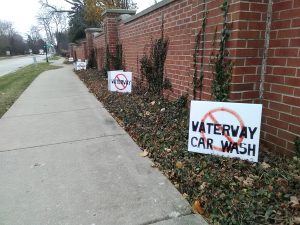Controversial Lake Forest commercial project clears hurdle
By Gregory Harutunian For Chronicle Media — December 11, 2017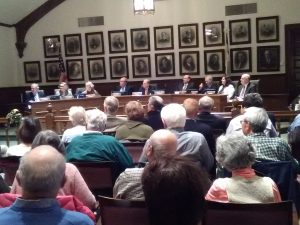
The Lake Forest City Council chambers were packed with more than 220 residents regarding a controversial car wash-gas station proposal. (Photo by Gregory Harutunian/For Chronicle Media)
Repeatedly citing a faith in the process, and doing something with its southern approach corridor on Waukegan Road, a majority of the Lake Forest City Council members voted in favor of forwarding a controversial gas station-car wash project to the city’s Building Review Board for further refinement. The 5-3 affirmative vote came during its Dec. 4 session, despite more than 20 people speaking against the endeavor in the public comment section.
The emotionally charged atmosphere to discuss the commercial project, led Mayor Rob Lansing to move the item to the first order of business. More than 220 people had packed the council chambers, most registering displeasure with the commercial project as detrimental to the neighborhood fabric, and others in the audience to speak against a planned “third rail” proposal on the nearby Amtrak lines that would skirt nearby the vacant lot at the southeast corner of the intersection at Everett and Waukegan roads.
“The site has been vacant for about 10 years, and our plan commission spent three long evenings, and read many pages,” said Lansing. “They asked for more documents to complete their process, and give a strong foundation. A 2008 special use permit for a drug (there), due to the economics of the time, didn’t move forward. Today, neighbors oppose reviving the permitting.
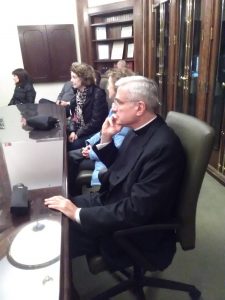
St. Patrick Church’s Monsignor Robert Dempsey listens to council discussion, at the Dec. 4 session. (Photo by Gregory Harutunian/For Chronicle Media)
“Your impact is valued, and your correspondence was reviewed, we’ve listened, and it has helped shape the final decision,” he said. “The (city) council has … to vet the compatibility, and consider the special use permit for the car wash and the first reading of the draft ordinance.”
The council was faced with three options: kill the ordinance completely, refer it back to the city’s Planning Commission for more revision and study, or approve the first reading of the draft ordinance that would allow special use permits and conditions for the commercial venture while moving it forward to the city’s Building Review Board. The latter option would address landscaping, architecture of the structures, signage and other conditions.
At issue is a B-1 zoning for the site that allows commercial concerns conducive to the neighborhood that necessitates the granting of variant permits. The 69,000-square-foot lot includes the southeast corner of the intersection, and the shuttered former Pasquesi garden shop to the south. It will be leased for fifty years by the Waterway Carwash Corporation, with Northbrook offices, and large combination gas station-convenience store-car wash operations in Missouri, Kansas, Colorado, and Ohio.
The neighborhood contains a mix of residential housing, the historic St. Patrick Church and Rectory, as well as the School of St. Mary grade school center. One issue was increased vehicle traffic using church parking lots to turn around or cut through to the state route. The Everett Road car wash access has one-way turns in and out.
“We have mothers and father coming in the morning to drop off and pick up children, in the proximity of St. Mary’s,” said John Isaia, the parish’s facilities manager. “With the Metra Station, Everett Road’s constraints, and a car wash … it’s a bad recipe.”
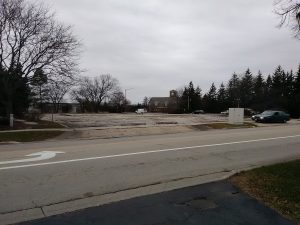
Located at the intersection of Waukegan and Everett roads, the vacant lot is being sited for a car wash-gas station. (Photo by Gregory Harutunian/For Chronicle Media)
The city’s Community Development Director Catherine Czerniak gave a presentation, recapping the plan commission’s findings, along with identifying their five issues with the project including noise and traffic.
“The commission has done their due diligence in voting 4-2, and forwarding the ordinance to the council,” Czerniak said. “Traffic studies and traffic warrants have been completed, along with acoustical studies.
“IDOT hasn’t agreed to permits and (won’t) until the final phases of the city’s permitting. The project needs to comply with state and federal environmental protection agency requirements for water recapture, sound mitigation and a post-construction sound study, (compromised) shorter hours of operation, and no night lighting except security.”
She also indicated that the project does not contain elements of a planned unit development with a regulatory process that issues permits as the plans move ahead, although many aspects of the construction and design have yet to be refined.
“The special use permit outlines the conditions and contingencies that are required,” she said.
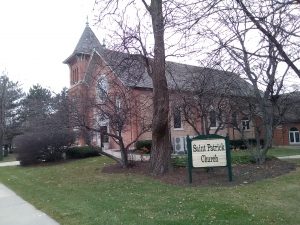
The historic St. Patrick’s Church and Rectory is immediately north of a proposed commercial development. (Photo by Gregory Harutunian/For Chronicle Media)
Many audience members questioned where the responsibility and enforcement of the conditions would reside, and two council members stated the business is capable of “policing themselves.”
Ald. Michelle Moreno, representing the 4th Ward that includes Everett Road, noted, “This is too much development on one space. It’s a very constrained site, not the right (traffic) paths, and too much intensity on the site to approve a special use permit. It abuts residential properties … including the church properties.”
Ald. Raymond Buschmann, also of the 4th Ward, stated, “B-1 is a neighborhood distinction, which gets lost in the conversation, small businesses required for the needs of the neighborhood, a residential neighborhood. This is not just one deviation for the permit, with up to 1,000 cars turning each day at a busy intersection, the high noise … it doesn’t meet the standards of a small business. A petition with 500 signatures was submitted, against this project.”
Monsignor Robert Dempsey, of St. Patrick’s Church, spoke about the detriments to the area.
“I am proud to be represented by the 4th Ward aldermen, and won’t give a prepared statement,” he said. “They speak to the general welfare and common good, especially when one segment of the population suffers undue hardship. We all want the best for the city, but not at the expense of others.”
Moreno, Buschmann, and Melanie Rummel voted against the measure, although the 5-3 approval sends the matter to the city’s Building Review Board, but will ultimately return to the council for final vote. The board met Dec. 6, although the project was not listed as an agenda item.
After the meeting, Alexander “Sandy” Stuart, owner of the property, said, “This is only one step in the process, and we’ve only cleared the first hurdle. There was a lot of emotion.”
A tax-increment financing district was initiated by the council for the Waukegan Road corridor, more than a decade ago. Stuart stated that no TIF funds are being offered for the project. “Basically, I’ll be a long-term ground lease owner for fifty years,” he said.
A tax-increment financing district effectively freezes a parcel’s equalized assessed valuation rate for a period of up to 23 years, with acceptance of the designation by taxing bodies in its boundaries. Any money collected above the frozen rate go into a special fund to be used for infrastructure and other improvements to the parcel, which must meet the criteria for undeveloped or blighted land.
—Controversial Lake Forest commercial project clears hurdle–

